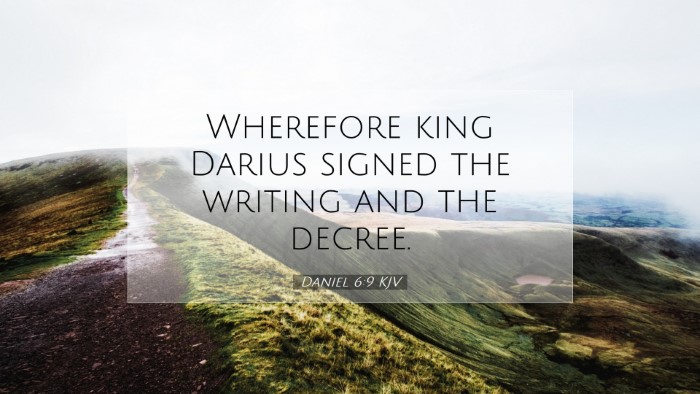Commentary on Daniel 6:9
Daniel 6:9 (KJV):
The verse presents a crucial moment in the narrative of Daniel, showcasing the political and spiritual dynamics at play in Babylon under King Darius. Below, insights from various public domain commentaries are synthesized to elucidate the significance of this text.
Contextual Background
The backdrop of Daniel 6 is set during the reign of Darius, a Persian king. This chapter describes the challenges faced by Daniel as a faithful servant of God in a foreign court. The context is essential in understanding the motivations behind the king’s decree and the conspiracy against Daniel.
Insights from Matthew Henry
Matthew Henry emphasizes that the signing of the decree by Darius was a hasty and ill-advised decision influenced by the scheming officials who sought to undermine Daniel. This highlights the theme of jealousy and the trials that arise from maintaining faith in a secular environment.
- Decision Influences: Darius, pressured by his leaders, yielded to a request that seemed to elevate his status while simultaneously targeting Daniel.
- Importance of Faithfulness: Despite the decree, Daniel’s commitment to prayer was unwavering, which underscores the faithfulness expected of believers even in the face of opposition.
Insights from Albert Barnes
Albert Barnes notes the significance of the decree and how it reflects the governance principles of the Persian empire, particularly the unalterable nature of royal edicts. This aspect sheds light on the constraints faced by Darius post-decree, showing a king bound by his own laws.
- Legal Implications: Barnes points out that Darius’s decree, once signed, could not be revoked without severe consequences, illustrating the challenges of governance versus personal integrity.
- Character Examination: This moment reveals Darius's character—his benevolence towards Daniel juxtaposed with his vulnerability to manipulation by those aiming to harm Daniel.
Insights from Adam Clarke
Adam Clarke views the signing of the decree as an act that set the stage for a profound test of faith for Daniel. He emphasizes the irony of a decree intended for idolatrous devotion forcing Daniel into a deeper commitment to the true God.
- Challenges of Faith: Clarke stresses that trials are often the backdrop for God’s greater purposes, which will ultimately glorify Him through the steadfastness of His servants.
- Divine Sovereignty: He highlights that even the actions of secular rulers fall under God's sovereign plan, turning what was meant for harm into opportunity for divine revelation.
Theological Implications
This verse serves as a reminder of the interplay between divine sovereignty and human actions. While Darius acts out of pressure and perhaps a desire for control, the narrative reveals God’s overarching plan for Daniel’s protection and deliverance. The decree, initially a tool for persecution, becomes a stage for God’s glory to be revealed.
Faith in Adversity
The steadfastness of Daniel reminds believers that faithfulness to God may lead to trials, but these trials serve as testimonies of faith in action. The unwavering commitment of Daniel becomes a model for believers today who face societal pressures to conform.
Leadership and Accountability
Darius’s decision-making process highlights the influence of counselors and the weight of leadership. It prompts a reflection on how leaders must discern God’s will amid external pressures and influence, ensuring that their decisions align with divine principles.
Conclusion
In summary, Daniel 6:9 encapsulates the tension between political authority and spiritual integrity. It serves as a powerful reminder for pastors, students, and theologians to remain steadfast in faith regardless of the circumstances. The lessons drawn from this verse encourage the reader to recognize the providential hand of God at work, turning even opposition into opportunities for divine intervention and testimony. As such, they should cultivate lives of prayer and reliance on God, affirming with Daniel that loyalty to God supersedes all earthly decrees.


